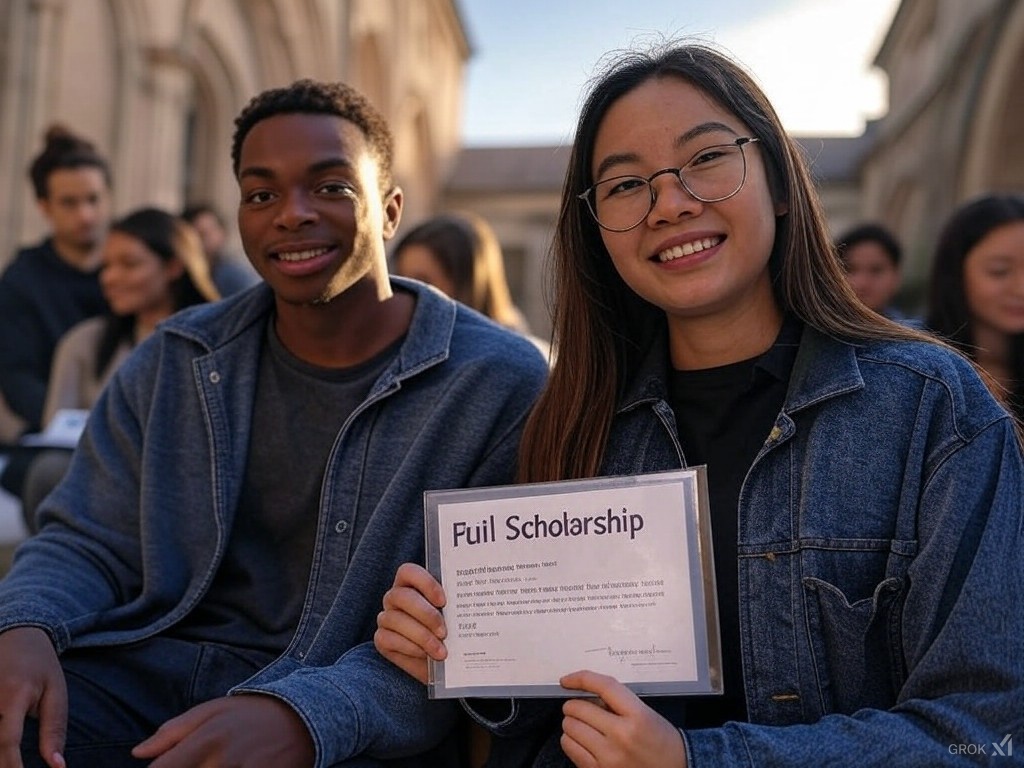Germany is one of those countries that has quietly become a hotspot for international students. And honestly, it’s not hard to see why. Most public universities there don’t even charge tuition fees, which is surprising when you think about how expensive school can get in other countries. But even if tuition is free, living costs like rent, food, and transport don’t exactly go away you’ll still need some serious help.
That’s why scholarships are super important. Currently, Germany is offering a bunch of scholarship opportunities for students from all over the world. What’s the best part? Some of them will cover everything. I’m talking rent, food, transport, even your insurance. If you’re looking to study in Germany without emptying your entire family’s life savings, this guide is for you.
A Quick Overview of Scholarships in Germany for International Students
Now before we jump into the actual list of scholarships, here’s what you should know. Germany doesn’t just throw scholarships at people. But they do have a pretty generous setup, especially if you’re serious about your studies.
Most scholarships will offer monthly allowances. It’s usually between €850 and €1,500 depending on your level of study and the specific scholarship. Some are fully funded, meaning they’ll even pay for your flight tickets, insurance, books, and more. Others might be partial, which means they help with some stuff but not everything.
A lot of the big scholarships are funded by government bodies (like DAAD), political foundations, or the universities themselves. And honestly, whether you’re applying for a Master’s in Engineering or a PhD in Social Sciences, there’s probably a scholarship out there with your name on it.
Eligibility Requirements for Scholarships for International Students in Germany
Okay, let’s talk about what it takes to qualify. Most scholarships have pretty straightforward requirements. But yeah, you still need to meet a few boxes. Here’s what they usually ask for:
- Good grades — You don’t need to be Einstein, but don’t come with all F’s either.
- Language Proficiency — Usually English (IELTS or TOEFL), but some ask for German too.
- Proof you’re applying or already admitted into a German school.
- Motivation Letter — A heartfelt essay explaining why you deserve the scholarship.
- Recommendation Letters — From your lecturers, employers, etc.
- Sometimes work or volunteering experience — especially for postgrads.
Oh, and some scholarships only accept students from specific countries. So yeah… always read the details on the official scholarship page. Don’t just assume.
Top Scholarships in Germany for 2026/26 You Should Totally Check Out
Alright, let’s get to the interesting part which is the actual scholarships. These ones are tried, tested, and open (or opening soon) for this year. I’ll keep it simple, straight, and useful.
DAAD Scholarship
This one’s the most famous and the big boss of scholarships in Germany. DAAD (that’s short for Deutscher Akademischer Austauschdienst) is like the king of German scholarships. It’s available for Master’s and PhD students, mostly.
They offer €934 to €1,200 per month, plus health insurance, travel allowance, and sometimes even rent assistance.
The deadline for DAAD varies by program, but most of them close between October and December 2024.
I will advise you to apply early. Seriously. And don’t sleep on your motivation letter cos they care a lot about that.
Heinrich Böll Foundation Scholarship — For the World Changers
This foundation awards scholarships to about 1,000 students every year. It’s open to international students from all academic fields who are pursuing their Master’s or PhD in Germany.
This one is for students who are passionate about politics, social justice, sustainability. You get the vibe. You could get €1,200 per month plus extras like travel support or research grants.
Just note that they expect a real commitment to social issues, not just good grades.
What’s the deadline? Usually March 1st and September 1st, so there are two chances in a year.
Konrad-Adenauer-Stiftung (KAS) Scholarship
KAS is a political foundation that supports students who are into public service, politics, law, or journalism. They want people with leadership potential and a strong academic background.
Master’s students get €861/month, while PhD students get €1,200/month.
You’ll probably need to do an interview and show you’re involved in your community.
If you’re looking to know what’s the deadline. Then it’s around July 15, 2026, but don’t wait till the last minute.
Friedrich Ebert Stiftung Scholarship
This scholarship program supports students who believe in equality, human rights, and democracy. You don’t have to be a top academic genius, but you do need a strong personal story and social engagement.
They give €850 to €1,200 per month, depending on your level of study.
Interestingly, there’s no set deadline as they take applications year-round. But apply early while funds are still flowing.
This is perfect if you’re already in Germany and just need that extra support.
Erasmus+ Scholarship
Erasmus+ is gold if you’re going to Germany as part of a joint European Master’s program. It’s funded by the EU and covers tuition, monthly allowance (€1,000 or more), and travel.
The application deadline for this scholarship depends on the program, but most close around January to March 2026.
I will advise you to check the specific university website for the Erasmus+ course you’re applying to.
Deutschlandstipendium (Germany Scholarship Program)
This one is more like a helping hand. Deutschlandstipendium is a merit-based scholarship offered by individual universities and funded by both the government and private sponsors. It gives you €300 per month, funded by the German government and private sponsors. It’s merit-based, so your grades do matter here.
The deadline for Deutschlandstipendium varies by university, usually between June and July 2026.
It’s a bit of extra cash in your pocket while you study. Not fully funded, but still helpful.
Frequently Asked Questions
Do you have qot questions? You’re not the only one. Alright, let’s quickly hit some of the stuff that’s always floating around in people’s heads regarding scholarship in Germany.
How can an international student get a full scholarship in Germany?
In order to answer your question, I will advise you apply to the big ones like DAAD, KAS, and Heinrich Böll. Make sure your motivation letter is solid, your documents are ready, and your grades are decent. Also, apply early. Last-minute apps rarely win.
Which German scholarship is fully funded?
DAAD is your best bet. Also look into Friedrich Ebert, KAS, and Erasmus+. They cover pretty much everything you’d need.
Which country is easiest to get a fully funded scholarship?
Germany is definitely one of the easier options. No tuition fees at most public schools and plenty of funded programs. Norway and Finland are also pretty generous.
Which scholarship is available now in Germany?
DAAD applications open in late 2026. Deutschlandstipendium is usually open by summer 2026. Check each website because deadlines vary.
Who can sponsor me to study in Germany?
Scholarships, obviously. But also private sponsors like NGOs, companies, or even family (if they meet the financial requirements set by the German embassy).
When to apply for scholarships in Germany?
Well, between October 2024 and March 2026 is the sweet spot for most scholarships. But again, always confirm with the official scholarship sites.
Conclusion
Getting a scholarship to study in Germany isn’t magic. It’s about doing the research, getting your documents in shape, and applying early. Don’t feel like you need to have it all figured out on day one rather just start.
Even if you don’t land a full scholarship, partial ones can still make a big difference. And the experience of studying in Germany is totally worth the hustle. So what’s stopping you now?


